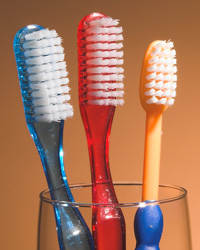Gum Disease Treatment - Near You in
Admiralty Dental Center
Appointments: (360) 385-7003

Edward Savidge D.D.S.
Admiralty Dental Center
600 Cliff Street
Port Townsend, WA 98368





If you suffer from periodontal disease or want to make sure you avoid it, Port Townsend area gum disease dentist Dr. Edward Savidge offers the solution with non-surgical preventive gum therapy. Look and feel your best with healthy gums and an attractive smile.
You're unique, and you deserve quality, individualized care. Dr. Edward Savidge believes your dental experience should blend the best of the personal and the professional. At Admiralty Dental Center in the Port Townsend, Washington area, we take the time to get to know you and understand your dental needs. Dr. Savidge and his staff are dedicated to providing you with top-quality dental care designed exclusively for you.
With IV sedation you'll have no memory of your dental procedure at our Port Townsend area sedation dentistry practice. Since you are safely sedated during the treatment, you experience virtually no pain. You'll simply wake up to your successful results.
Admiralty Dental Center offers designated handicap parking spaces for the exclusive use of vehicles displaying handicap hangtags or disabled license plates. Conveniently located in the Port Townsend, Washington area, Dr. Edward Savidge provides dental hygiene and offers fully accessible facilities.
Have you ever considered natural-looking, permanent dental implants instead of uncomfortable dentures? Incredible recent advances in technology allow Port Townsend area dental implants dentist Dr. Edward Savidge to create tooth implants just for you that can be permanently anchored to your jaw. This is a great option to consider if you've had negative experiences with dentures in the past.

More Dental Hygiene Dentists in the Port Townsend, WA Area Near You
Dr. Danielle Nichole Tomlinson D.D.S.
701 Regents Blvd.
Graham , WA, 98338
Dr. John D. Olsson D.D.S.
1919 N. Pearl St. Ste A-1
Lakebay , WA, 98349
Doctor - Activate Your Free 1stDentalHygiene Directory Listing
Dr. Suzanne Ruth Megenity, D.D.S.
1801-1st Avenue Suite 2A
Longview, WA, 98632
Cascade Oral Surgery
101 West Cascade Way; Suite # 103
Spokane, WA, 99208

